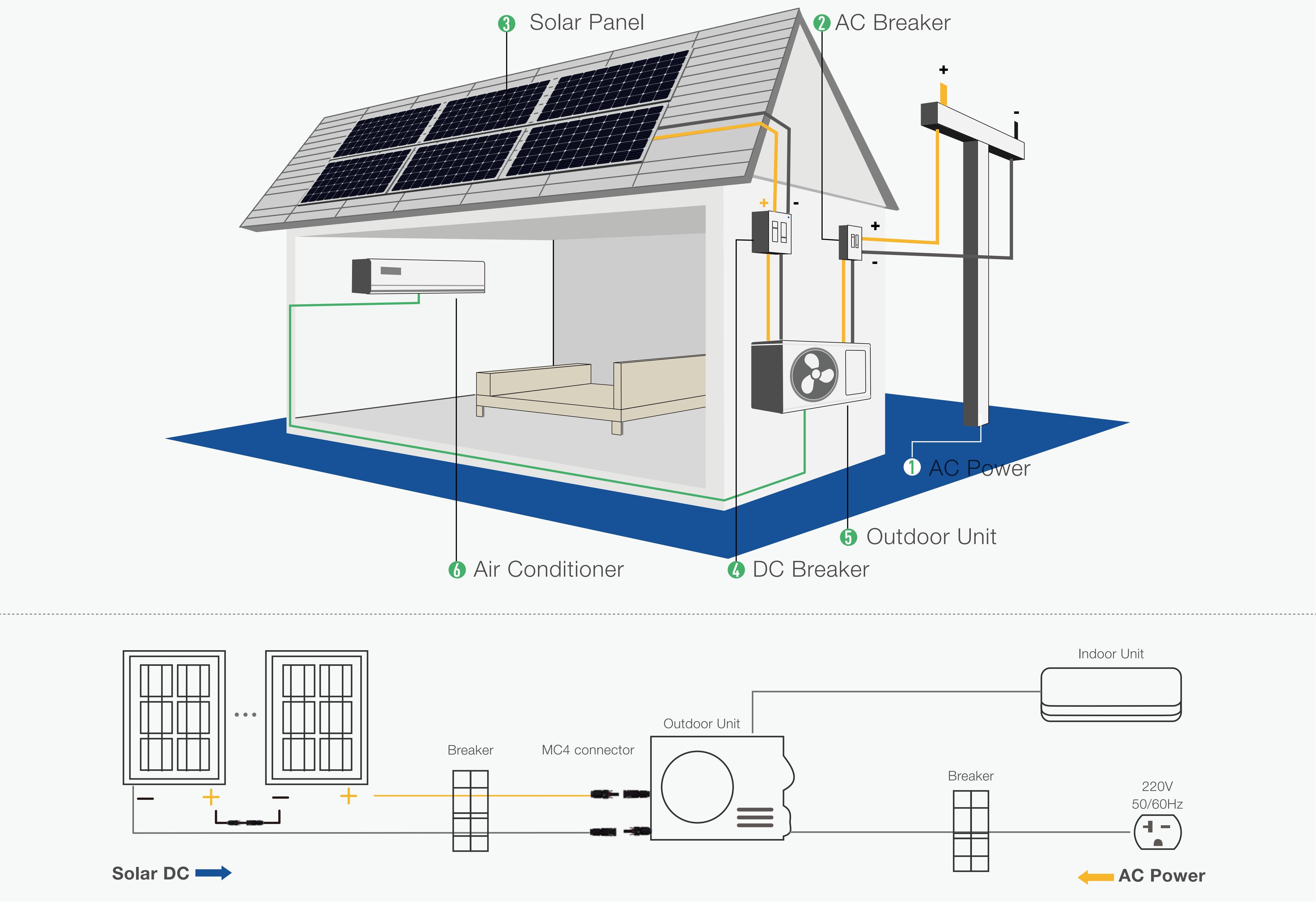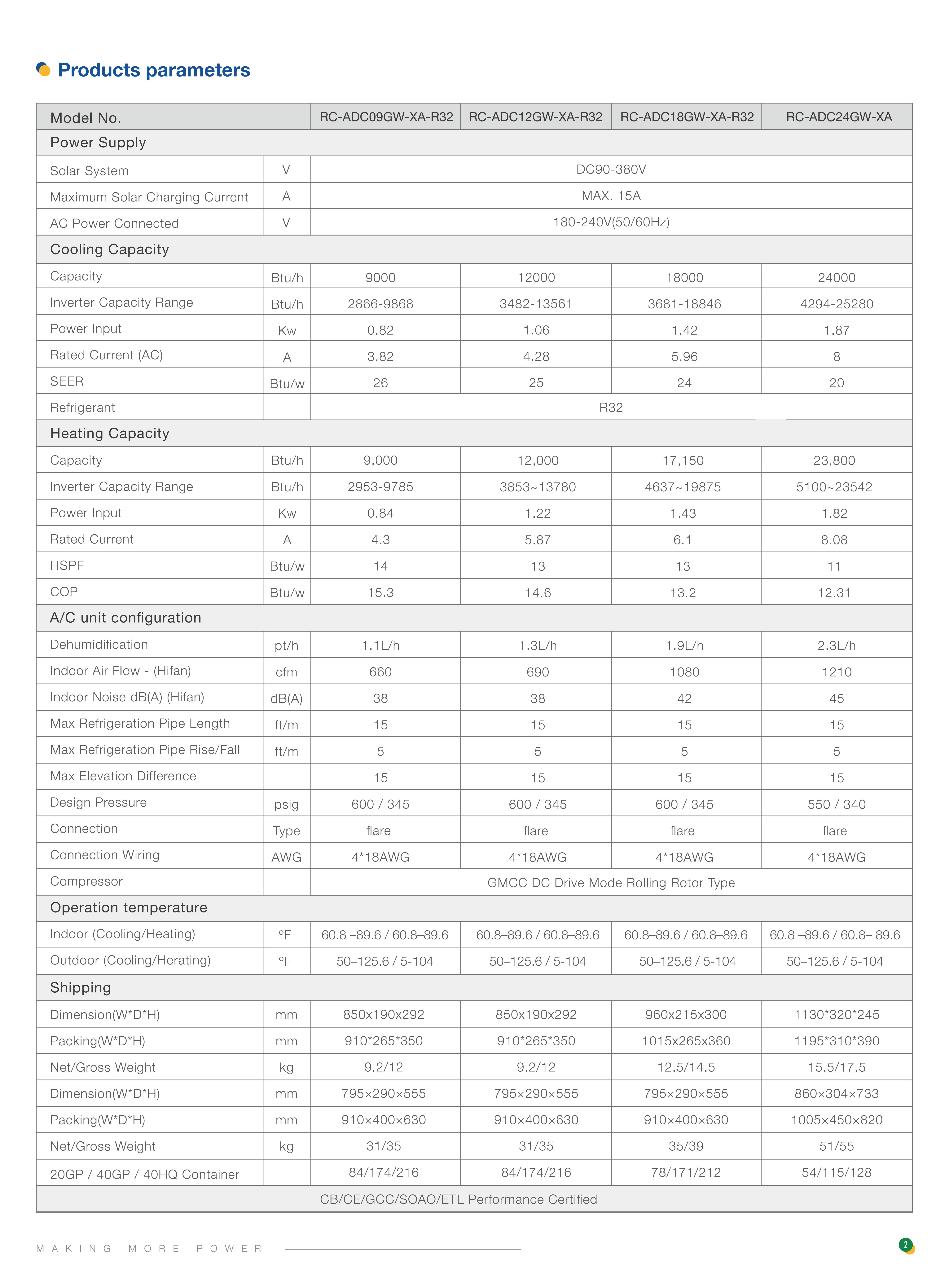Remember to consult with an HVAC professional or a solar energy expert to ensure that the system you choose is appropriate for your specific needs and installation requirements.
Solar panel voltage:
DC90-380VMaximum Solar Charging Current:
15AAC Power Connected:
180-240V(50/60Hz)Refrigerant:
R32Compressor:
GMCC DC Drive Mode Rolling Rotor TypeConnection:
Flare
When choosing a good solar-powered air conditioner, there are several factors you should consider. Here are some key points to keep in mind:
Energy Efficiency: Look for a solar air conditioner that has a high energy efficiency rating. This will ensure that it maximizes the amount of cooling you get per unit of solar energy generated.
Cooling Capacity: Consider the size and cooling capacity of the air conditioner. Make sure it is suitable for the space you intend to cool. An undersized unit may struggle to cool the room, while an oversized unit may consume more energy than necessary.
Solar Panel Compatibility: Check if the solar air conditioner is compatible with the solar panels you plan to use or if it comes with its own integrated solar panels. Ensure that the panel's power output matches the air conditioner's power requirements.
Battery Backup: Some solar air conditioners come with battery backups, allowing them to operate even when there is no direct sunlight. This can provide continuous cooling during cloudy days or at nighttime.
Warranty and Maintenance: Look for a reputable manufacturer that offers a warranty on the solar air conditioner. Also, consider the availability of maintenance and servicing options, as regular maintenance is required to keep the system functioning optimally.
Cost and Affordability: Evaluate the cost of the solar air conditioner, including the solar panels and installation costs. Determine if it aligns with your budget and if the long-term energy savings justify the initial investment.
Reviews and Recommendations: Read customer reviews and seek recommendations from experts or people who have already installed solar air conditioners. Their experiences can provide valuable insights into the performance, reliability, and user satisfaction of different products.
Energy Monitoring and Control: Some solar air conditioners come with monitoring and control systems that allow you to track energy usage, adjust temperature settings, and optimize efficiency. Consider these features if you value the ability to monitor and manage your energy consumption.

To Choose a good solar air conditioner involves considering several important points, here are some key considerations to help you make an informed decision:
Cooling Capacity: Assess the cooling capacity of the solar air conditioner. It should be suitable for the size of the space you want to cool. Consider factors like room size, insulation, and local climate.
Energy Efficiency: Look for a solar air conditioner with high energy efficiency ratings. Check for a SEER (Seasonal Energy Efficiency Ratio) rating—the higher the SEER, the more efficient the system.
Solar Power Requirements: Determine the solar power requirements of the air conditioner. Consider the number of solar panels and their capacity needed to run the system efficiently. Ensure that your available space and solar resources can support the requirements.
System Integration: Consider if the solar air conditioner is compatible with other solar power systems and equipment you may have or plan to install. This includes inverters, batteries, and energy monitoring systems.
Durability and Reliability: Check the quality and reputation of the manufacturer. Look for warranties offered, customer reviews, and certifications like ENERGY STAR. A reliable solar air conditioner should be built to withstand harsh weather conditions.
Cost and Affordability: Compare the prices of different solar air conditioning systems, considering the initial investment, installation costs, and potential long-term savings on energy bills. Calculate the payback period to determine its cost-effectiveness.
Professional Installation: Ensure that the solar air conditioner requires professional installation and find out if it comes with installation services or recommendations for qualified installers in your area.
Additional Features: Consider any additional features or functionalities that may be important to you, such as remote control operation, programmable settings, air quality filters, or smart home integration.
Maintenance and Support: Inquire about the maintenance requirements of the solar air conditioner. Find out if the manufacturer provides support, servicing, and spare parts availability locally.
Local Regulations and Incentives: Familiarize yourself with any local regulations, permits, or incentives related to solar air conditioning. This includes potential tax credits, rebates, or subsidies that could help offset the costs

Solar air conditioners can provide significant energy savings depending on various factors such as the size of the system, climate conditions, energy consumption of the air conditioner, and the availability of sunlight. Here are some key considerations:
System efficiency: Look for a solar air conditioner with high energy efficiency. This will ensure that the system maximizes the use of solar energy and minimizes energy waste.
Sizing the system: Properly sizing the solar air conditioner is crucial. An oversized system may lead to unnecessary costs, while an undersized system may not meet your cooling needs. Consult with a professional to determine the appropriate size based on your space's cooling requirements.
Climate conditions: Solar air conditioners work best in sunny climates with abundant sunlight. If your area experiences long hours of sunshine, you'll likely see greater energy savings compared to areas with frequent cloud cover or limited sunlight.
Orientation and shading: Ensure that your solar panels are positioned correctly to receive maximum sunlight exposure throughout the day. Avoid shading from nearby trees, buildings, or other obstructions that can reduce the efficiency of the panels.
System integration: Consider how well the solar air conditioner integrates with the existing electrical infrastructure of your home or building. You may need to consult with a professional to ensure proper installation and integration with your electrical system.
Financial incentives: Research any available financial incentives or rebates for installing solar air conditioners in your area. These incentives can help offset the initial installation costs and improve the overall return on investment.
It's important to note that the actual cost savings will vary based on the factors mentioned above, as well as the specific energy consumption of the solar air conditioner and the cost of electricity in your region. Evaluating these factors and consulting with solar experts or HVAC professionals can help you determine the potential cost savings specific to your situation.
FAQs:
Q1: Do you support OEM/ODM?
A:Definitely, OEM&ODM service is supported with a certain quantity,including customize logo,package and label;
Q2: What's the production time?
A: The production time is normally 15 working days. but we will always prepare some stocks for popular models.
Q3: Can you provide DDP service?
A:Yes, if you are a personal customer and don't want to deal with the customs, we can provide DDP service to your address.
Q4: What about the warranty and how to claim?
A: Warranty period are 5 years since you receive the product, our professional after-sales team will deal with all warranty issues.